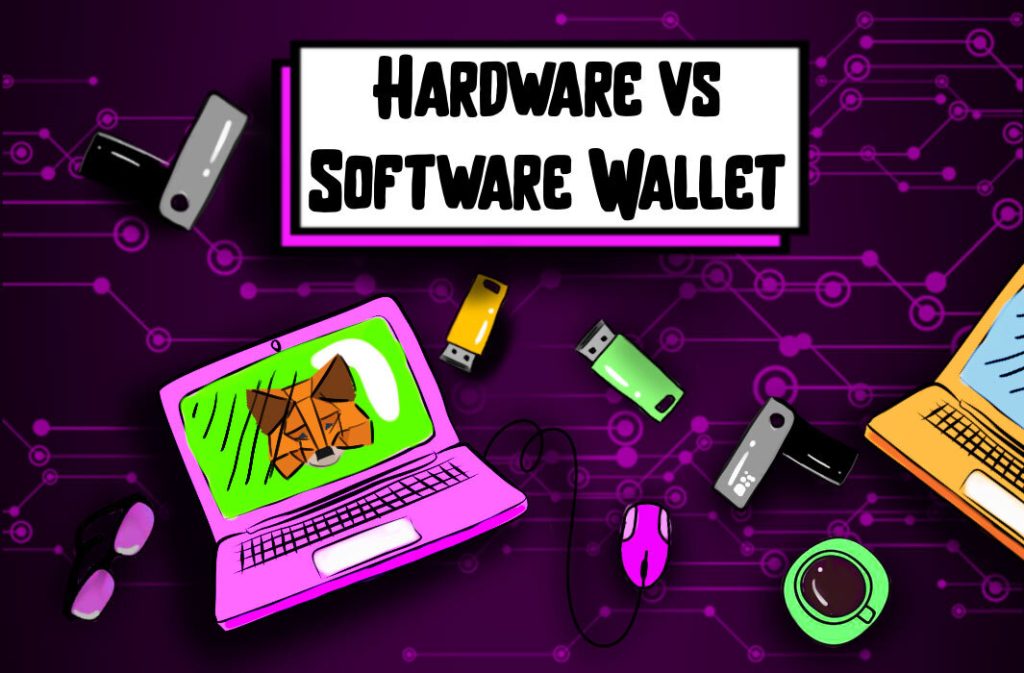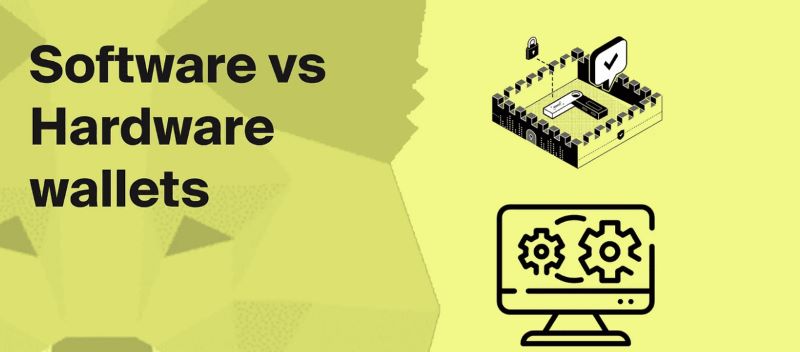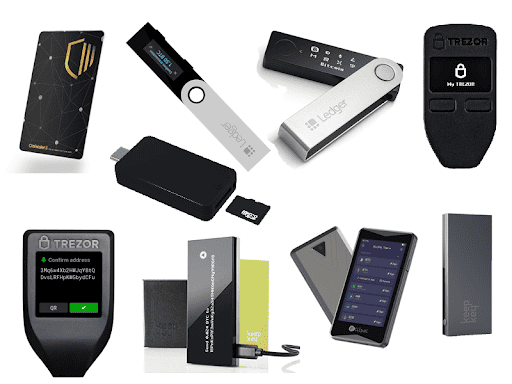Hardware wallet vs software wallet: it’s the battle for your digital gold. Tossing and turning over which wallet to trust? You’re not alone. I live in the trenches of crypto security, and I’ve seen it all—the good, the bad, and the ugly hacks. With my insight, let’s break it down, so you can sleep sound without fear of waking up to an empty vault. Keep reading to discover which wallet not only stands guard over your coins but does it with ironclad diligence.
Understanding the Basics of Crypto Storage Solutions
Distinction Between Hot and Cold Storage Methods
Hot and cold storage methods are key in cryptocurrency. Hot storage wallets connect to the internet. Think mobile wallet apps and browser wallet extensions. These are great for easy access to your funds. Cold storage wallets, like USB hardware wallets, do not connect. They are physical, like a safe for your crypto.
Have you asked, “What’s a cold storage wallet?” It’s a wallet offline, keeping crypto away from hackers. We can compare it to a bunker, where your valuables stay locked up tight, away from any danger that might come from being constantly connected to the outside world.
In contrast to this, hot storage wallets stand at the front lines. They’re daily drivers, letting you pay and trade. Think of your online wallet as your physical one—it has cash for daily spending but keeps most of your money elsewhere for safety.
Evaluating Hot Storage: Software Wallets and Their Accessibility
How easy is accessing crypto wallets that are software-based? Very easy. They live on devices you use, like phones or laptops. Software wallet security risks come with this ease, though. Phishing attacks target these often, tricking users into giving away secrets.
Back to our question, “What are software wallet security risks?” Mainly, they face threats from hackers. A virus or malware can put your crypto at risk. The same goes for using public Wi-Fi, which might not be secure. Even browser wallet extensions can have weaknesses.

Hardware Wallet vs Software Wallet
But the balance leans towards convenience, as software wallets are handy. They are simple to use, and you can get to your funds quickly. That’s why mobile wallet apps and desktop crypto storage are popular. You can trade, pay, and check your balance in just a few taps.
There are ways to make hot wallets safer, though. Use strong passwords and keep your devices secure. Always update your software to patch up any security holes. And if a wallet asks for a seed phrase during a transaction, that’s a huge red flag—genuine wallets will never ask for this during a transaction.
So, hot or cold? Your choice depends on how you use your crypto. If you trade a lot, maybe hot storage makes sense. For big savings, cold storage wallets might be better. It’s like picking a car. Do you need speed for daily tasks, or strength and security for precious cargo?
In the next sections, we’ll dive even deeper. We’ll cover the specific security risks of software wallets and the strong defense offered by hardware options. Plus, we’ll explore how features like multi-signature and backup strategies build an even tougher security wall around your digital treasure chest.
Assessing Security Risks: Hardware vs Software Wallets
The Vulnerabilities of Software Wallets and Online Platforms
Let’s talk about keeping your crypto safe. You know, like treasure in a chest. Software wallets are like keeping your treasure chest in your room. Handy, yes, but what if a thief sneaks in? That’s your software wallet security risk. They live on your computer or phone. They’re always online—or ‘hot’ as we say. That means hackers can attack them.
Online wallets have the same problem. Think of it. They’re like leaving your treasure on a table in a busy market. Anyone could snatch it or trick you into giving it away. That’s phishing. And remember, more people around means more sneaky eyes on your crypto coins.
Now, you like those mobile and desktop crypto storage options for quick access. Who wouldn’t? But quick access also means quick for bad guys too. So, keep that in mind when using hot storage wallets.
How Hardware Wallets Offer Enhanced Security
Alright, ready for the big secret? It’s hardware wallets. Think about those cold mountain caves where pirates hid their loot. Hard to get to, but super safe, right? That’s a hardware wallet. It keeps your crypto offline in ‘cold storage’. No internet, no hack. Simple.
These physical crypto wallets, like USB sticks that you plug into your computer, are the best wallet for crypto security. They talk to the blockchain only when you say so. Because of this, hackers would need the actual device to steal your coins. Even then, they’d need your secret pin and backup seed phrases. That’s like a double-locked treasure chest.
Names like Trezor and Ledger might ring a bell. They’re the big guns in USB hardware wallets. Why are they so cool? Because even if your computer is infected, your crypto stays safe when you use them.
Hardware wallets often ask for a pin code when you plug them in. Plus, with offline wallet benefits like these, you’re taking back control. Your keys, your coins. And that’s smarter than any pirate.
Now, don’t get lost at sea with backup. You’ve got wallet backup strategies for this. Like an old map that leads to your hidden treasure, they are super important. Keep copies of your seed phrases hidden—think different spots that only you know.
So, let’s bring it home. Hardware wallets are like that tough, quiet kid in class that nobody messes with — strong and silent. Software wallets? Like the chatty kid who tells everyone his secrets. Choose wisely, friends. Keep your crypto treasure in the right chest.
Remember, you’ve worked hard for your virtual coins. Let’s make sure they stay yours, safe and sound. No hackers, no thieves, no worries. And if you’re ever in doubt, just ask yourself: What would the smartest pirate do? You know the answer.
Optimizing Wallet Security with Advanced Features
The Role of Multi-Signature and Seed Phrase Safeguards in Wallet Security
Multi-signature wallets are like a bank safe that needs two keys. More than one person must agree to open it. This means a hacker has to trick not just one, but several people to get in. This boosts security a lot. Think of seed phrases as secret codes to get back into your wallet if you get locked out. Write them down and keep them safe, away from the internet’s reach. If hackers can’t find your seed phrase, they can’t steal your crypto.
The need for multi-signature and seed phrase protections comes down to one thing: they stop thieves cold. While no system is perfect, these add layers to your defense. Think about your house. Would you feel safer with one lock or several, including a secret one only you know about? It’s the same with crypto. Your digital cash stays safe when more hurdles are in the way of the bad guys.
Implementing Two-Factor Authentication and Backup Strategies
Two-factor authentication (2FA) is like a double-check system. You log in, then confirm it’s really you by getting a code on your phone or email. This stops hackers who might know your password from getting into your account. Always turn on 2FA. It’s a simple step, but it’s powerful.
Next, let’s talk backups. Computers and phones can break or get lost. So, imagine if all your crypto went poof because your device did! That’s why wallet backup strategies matter. They help you set up a plan B, or even C, so you can sleep well knowing your crypto isn’t going anywhere you don’t want it to. Think of it like having spare keys. If one key is lost, you grab another and carry on. It’s smart to have a USB drive or maybe even paper with all your wallet details stored somewhere safe and separate from your daily gadgets.
Remember, backup copies should also be protected. Use the same security steps, like 2FA and encryption, on your backup solutions. The best wallet for crypto security is one with good habits behind it.
In summary, taking care of your crypto means setting up a strong defense. Use multi-signature setups to spread the access points. Guard your seed phrase like treasure. Keep hackers out with 2FA. And always have a backup strategy tucked away. With these steps, your digital wallet will be as tough as it gets.
Selecting the Right Wallet for Your Needs
Comparing the Cost and Usability of Hardware and Software Wallets
When picking a wallet for your crypto, think about cost and ease of use. Software wallets are free apps you can download to your phone or computer. They are handy. However, they come with risks. They are open to hacks when your device connects to the internet. This is because they are hot storage wallets. Yet, for daily use, software wallets win on ease.

The Shift Towards Non-Custodial Solutions for Full Asset Control
Now, there’s a shift happening. More people want non-custodial wallets. These are wallets where you control everything. You manage your private keys and don’t rely on a third party. So, they offer full asset control. This is great. But, it also means you must handle your wallet’s security. You’re in charge of your crypto’s safety.
Custodial wallets are the other kind. They’re often found in exchanges. They are easy to use. But, they hold your private keys. This could be a risk. If the exchange gets hit by hackers, your crypto might be at risk.
More people use non-custodial wallets. These come in both hardware and software forms. They agree with the principle: Your keys, your crypto. Remember, the best wallet for your needs will balance security and usability.
Blockchain wallet mechanisms keep evolving. We see more secure transaction signing. We also see better ways to cover private key protection. Whether you lean towards software wallets for their accessibility or hardware wallets for extra security, make sure to back up your seed phrases. Always explore wallet encryption methods to shield your assets further.
Wallets have different features too. Some have multi-signature wallets. This means more than one person must sign a transaction. It’s good for businesses or shared accounts.
As a specialist in cryptocurrency storage solutions, I watch these trends closely. Mobile wallet apps and desktop crypto storage have their place. Yet, when it comes to true security, a hardware wallet, like a Trezor or Ledger, often outperforms software and online wallets. It’s crucial to know the benefits of hardware wallets. But it’s equally important to consider how often you trade or need access to your crypto. This way, you make an informed choice on whether you opt for a hardware wallet or a software one.
Remember, balancing your digital wallet comparison not just on costs but on how they match your daily crypto routine ensures that your journey in cryptocurrency remains secure and functional.
In this post, we dug into crypto storage, learning what makes hot and cold wallets different. We saw that while software wallets are handy, they can be risky. Hardware wallets, on the other hand, are safer but cost more. Features like multi-signature and seed phrases also boost security, as does two-factor authentication. In the end, choosing between hardware and software wallets boils down to balancing cost, ease of use, and how much control you want. Remember, protecting your digital coins is crucial, so pick the best wallet that fits your needs and gives you peace of mind. Stay safe and stay smart with your crypto security! Follow Dynamic Cryto network to update more knowledge about Crypto.
Q&A :
What is the main difference between a hardware wallet and a software wallet?
A hardware wallet is a physical device designed to securely store cryptocurrency private keys offline, greatly reducing the risk of hacks and theft that are more common with internet-connected software wallets. A software wallet, on the other hand, is a digital program that can be used on various devices like smartphones or computers, offering convenience and quick access to assets but with a generally higher vulnerability to online threats.
How secure is a hardware wallet compared to a software wallet?
Hardware wallets offer enhanced security features. They store private keys in a protected area of a microcontroller, and therefore cannot be transferred out of the device in plaintext. They are immune to computer viruses that steal from software wallets and can be used securely and interactively. Software wallets, while more susceptible to malware and hacker attacks, can still be secure if proper security practices are followed, such as using strong passwords, enabling two-factor authentication, and keeping software up-to-date.
Can a hardware wallet be hacked?
While hardware wallets are designed to provide a high level of security against various attacks, they are not completely immune to all types of hacking. Physical theft of the device can be a risk, though PIN codes and passphrases usually protect against unauthorized access. Sophisticated attacks, like supply chain attacks or extremely targeted phishing attempts, could potentially compromise a hardware wallet, but such events are rare and often involve targeted rather than widespread risks.
Why might someone choose a software wallet over a hardware wallet?
Some users may prefer a software wallet for its convenience and ease of use, as it allows for quick transactions and accessibility across multiple devices. People who perform frequent trades or transactions might find software wallets more suitable. They are also often free, unlike hardware wallets, which can be a considerable factor for users not wanting to invest extra money in a physical device.
Are hardware wallets worth the investment for crypto security?
For individuals holding a significant amount of cryptocurrencies or planning to hold their assets long term, hardware wallets can be a worthwhile investment. They offer increased security by keeping private keys offline and reducing the risk of hacking. As with any security measure, the level of investment should be proportional to the value of the assets being protected.
Remember, no matter which type of wallet you choose, maintaining good security practices is key to protecting your digital assets.

